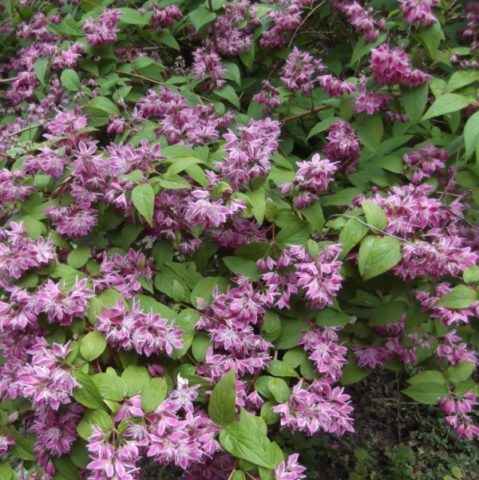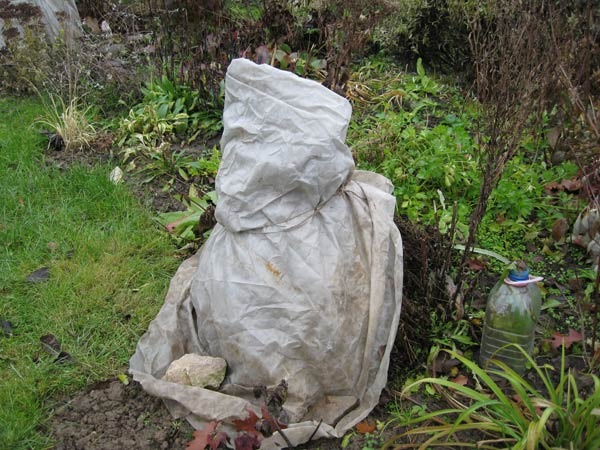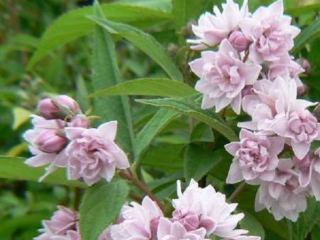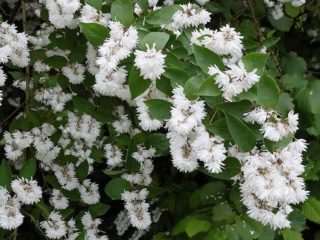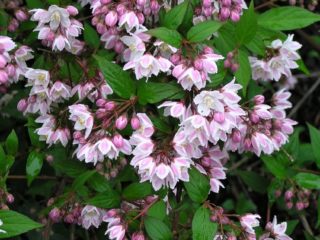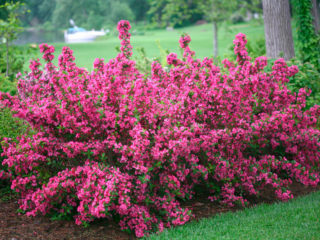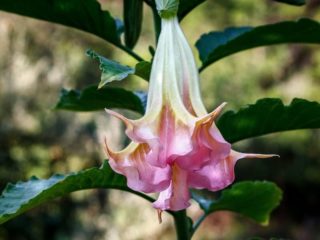Content
The magnificent deutzia Turbilon Rouge is an ornamental shrub, the name of which speaks for itself: the beauty and splendor of the flowering of this hybrid is often compared to the flowering of lilac or hydrangea, although the culture has not yet become so widespread and is considered an exotic plant.
Description of the action of Turbilon Rouge
In the photo of the Turbilon Rouge action you can see incredibly beautiful bushes literally strewn with magnificent pink flowers. However, the plant looks attractive even outside the flowering period.
The Deutia splendid shrub Turbilon Rouge has a dense crown of regular shape, formed by numerous flexible stems growing vertically upward. During abundant flowering, their ends droop under the weight of the inflorescences. Young branches have a characteristic red-orange bark with light stripes. The average height of an adult bush is 1.8–2 m, and the crown width usually does not exceed 1.2 m. With proper care, the bush can live for about 25 years.
The leaf blade is light green, becoming pinkish-yellow in autumn. The leaf has a rough texture, slightly pubescent, and has the shape of a narrow oval up to 10 cm long.
Deytsia magnificent Turbilon Rouge has average frost resistance - it can withstand temperatures down to -20°C.
How Deutia Turbilon Rouge blooms
The magnificent deutia Turbilon Rouge blooms in June-July. The shrub is covered with abundant flowers of medium size, collected in inflorescence-tassels. The star-shaped corollas are formed by five or six pink petals with a thin white edging along the inner edges and a lighter center. The outer part of the flower is dark pink with hints of purple. The flowers have a light pleasant aroma.
Features of reproduction
The easiest way to propagate the magnificent deutzia Turbilon Rouge is by cuttings. There are 2 ways to get new plants: from green cuttings cut in May-June, and from lignified branches, which are harvested in the fall and stored until spring in damp sand in a cool room. The technology for growing seedlings in both cases is as follows:
- cuttings sections are treated with a root growth stimulator;
- prepare a peat-sand soil mixture;
- The cuttings are deepened into boxes with soil mixture at an angle and sprinkled with sand.
Young deutsia are planted in a permanent place after 2 years.
Another convenient way to propagate shrubs is to form layerings. To do this, the lower shoots of the mother plant are bent, secured to the soil and sprinkled with earth. When the shoot takes root, it is separated from the main bush and replanted the next year.
In addition, deutia forms root suckers, so you can easily get a small number of young bushes by simply digging up and planting root suckers.
When propagated by seeds, the seed is placed in boxes with a nutritious soil mixture and stored in a cool place. In spring, seedlings can be planted in open ground, providing them with reliable shelter from the winter cold.
Planting and caring for the magnificent action of Turbilon Rouge
How spectacular the magnificent deutzia Turbilon Rouge will grow depends on the correct choice of location, soil preparation and compliance with planting rules. This type of plant comes from Asia, therefore, the technology of planting and caring for the magnificent action of Turbilon Rouge is aimed at creating conditions as close as possible to the conditions of the natural climatic zone.
Recommended timing
The magnificent deutia Turbilon Rouge is planted in early spring, after the soil has thawed, so that it has time to take root and gain strength for the winter. If it is not possible to plant it in March - April, you can do this until the end of spring. It is better to purchase a seedling immediately before planting.
Site selection and soil preparation
To grow the magnificent action of Turbilon Rouge, choose sunny areas protected from strong winds. It is better to plant plants in light partial shade so that direct sunlight does not harm them.
The shrub grows well on light fertile substrates with neutral acidity; loam and sandy loam are suitable for it. Soils that retain moisture, as well as areas with excellent surface groundwater, are contraindicated.
Preparing the soil for planting this plant includes digging to a depth of at least 50 cm, draining excessively wet soil, adding river sand and neutralizing the acidic substrate with ash or lime. The optimal soil composition for deytsia is a mixture of equal amounts of sand and humus with the addition of peat.
How to plant correctly
Deutia is planted in the same way as most other ornamental shrubs:
- dig planting holes up to 50 cm deep;
- humus, sand and turf soil are mixed to obtain a soil mixture, wood ash or slaked lime is added to the acidic soil, the mixture is enriched with mineral fertilizer complexes;
- a drainage mixture of gravel and sand is poured onto the bottom of the planting hole and a low mound of soil mixture is poured;
- immerse the seedling in the hole and cover it with the remaining mixture without deepening the root collar;
- water abundantly;
- The tree trunk circle is mulched.
Plants are planted at a distance of 2–2.5 m from each other.
The following video illustrates the general rules for planting deutia, including the Turbilon Rouge variety:
Growing rules
Deutzia magnificent Turbilon Rouge is an unpretentious ornamental shrub, but requires regular, albeit simple, care. To obtain healthy, beautifully flowering plants, periodic watering, fertilizing, pruning, and shelter for the winter are necessary.
Watering
Deutzia is a drought-resistant crop, but the soil should not be allowed to dry out. In normal summer weather, it is watered once every 2–4 weeks, in hot dry periods - up to once a week.
Mulching and fertilizing
A good way to make caring for this magnificent plant easier is to mulch the tree trunks. It allows you to avoid frequent loosening of the soil and weeding, which has a beneficial effect on the growth and flowering of this shrub.
The plant is relatively undemanding when it comes to fertilization. All feedings come down to the following cases:
- abundant application of fertilizers for planting;
- fertilizing with liquid mullein at the beginning of flowering (up to 4 liters per bush) or any other organic fertilizer. One option is to mulch the tree trunk circle with humus;
- application of mineral complexes 2 times per season (0.5–1 cup per plant).
Pruning rules
Pruning of the magnificent action of Turbilon Rouge is carried out in 2 stages:
- in the spring, dry, broken and frozen branches are removed, i.e., sanitary pruning is performed;
- in the summer, when the deutia has faded, its stems are shortened by 1/3 of the length in order to form a crown.
Preparing for winter
So that the branches of the bush have time to prepare for the winter cold, watering is stopped in August, and during the period of autumn rains the tree trunks are covered with waterproof material. Due to the lack of moisture, the growing season stops and wood ripens on young shoots.
Since the action of this variety is well adapted to low temperatures, in conditions of not too frosty winters it is enough to mulch adult plants with a thick (up to 10 cm) layer of dry foliage, spruce branches or other natural material.The magnificent Turbilon Rouge, which grows in conditions with harsh winters, is not only mulched at the end of autumn, but also carefully covered with insulating material, as shown in the photo:
A shrub prepared for winter can withstand frosts down to -30 °C. Remove the winter shelter after the snow melts.
Pests and diseases
Deytsia is extremely rarely affected by diseases and pests. The most common pest of the plant is the bumblebee proboscis, which feeds on leaves. Treating the bush with a 15% solution of karbofos helps against the invasion of these insects.
Conclusion
Magnificent deutzia Turbilon Rouge is a wonderful shrub for growing in gardens, decorating personal plots and landscaping various areas. Numerous photos of Deutia superb demonstrate the wide possibilities of its use in landscape design, and its relative unpretentiousness and adaptability to growing in the middle zone are increasingly attracting not only professional flower growers, but also amateur gardeners.
